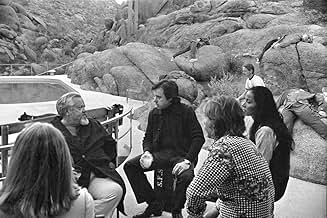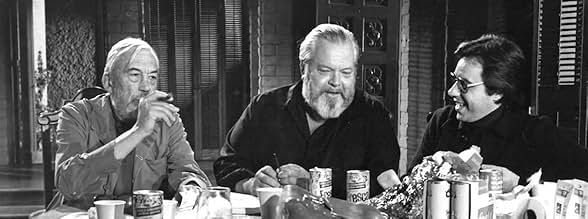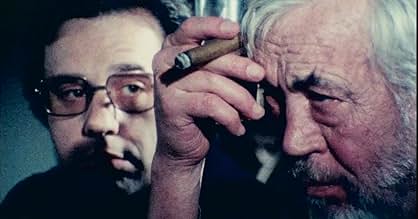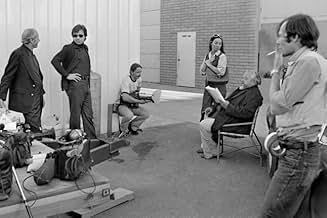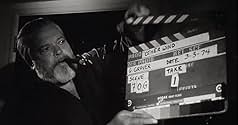In the final fifteen years of the life of legendary director Orson Welles, he pins his Hollywood comeback hopes on a film, De l'autre côté du vent (2018), in itself a film about an aging fil... Read allIn the final fifteen years of the life of legendary director Orson Welles, he pins his Hollywood comeback hopes on a film, De l'autre côté du vent (2018), in itself a film about an aging film director trying to finish his last great movie.In the final fifteen years of the life of legendary director Orson Welles, he pins his Hollywood comeback hopes on a film, De l'autre côté du vent (2018), in itself a film about an aging film director trying to finish his last great movie.
- Awards
- 2 wins & 2 nominations total
- Self - Director
- (archive footage)
- …
- Self - Camera Operator
- (as Mike Ferris)
- Self - Editor
- (as Jonathan Braun)
Featured reviews
Some of the stuff from the talking heads here is irrelevant (e.g. Welles's reported fondness for Fudgsicals) and armchair psychology, but there's enough information about the production of "The Other Side of the Wind," with clips not used in the release print edited in here, as well as looks at some of Welles's other pictures to make this documentary worthwhile. I think the end clip of Welles wishing that everyone would see his film is especially apt given its final distribution by Netflix, which as the most-popular online movie streaming service offers the best hope of fulfilling that wish. And, Welles's film may be the best thing Netflix has yet distributed. It's a fitting end for a film, too, that is partly about the death of classical Hollywood and the rise of a New Hollywood that admires an auteur of the prior generation and which features then-new forms of motion-picture making and viewing--TV, 16 and 8mm cameras and the drive-in theatre--technologies and platforms that themselves have since been largely or, at least, partially superseded by computers, digital technology, smart phones and streaming.
On a logistical level, this film is not what one would expect... most all of the friends and colleagues become talking heads who are not individually identified, until the rolling credits, where a slew of names are lined up. That said, Peter B is easily recognized, and a few others' identities are inferred by their comments. When Oja speaks, you are left to imagine what she looks like nowadays... I presume that she insisted that her sound bites would not include visuals.
What disappointed me the most were the cynical snipes made about the approach and demeanor of Welles, from several people closely associated with him. Some of their barbed comments served to discount the great complexity of this man. I wonder if these folks had enough nerve to frankly state their views in front of his face while he was alive? One celebrity commented on his demanding preference for a particular snack food. On the surface, the remark said more about her.
It strikes me as ironic that one clip shows Welles speaking on the essential value of editing, yet this film has chosen to slice things up into brief sound bites. As a result, the tone of the interviewees resemble a bitter pill, as if to say: while we might recognize the genius of this man, the viewer would do well to witness his significant deficiencies.
There are cherry-picked clips which try to convince the viewer about Welles impulse to control the details. Newsflash: many great artists fall prey to obsessiveness. We see Welles give a specific note to Norman Foster on his delivery. Foster transformed the line in-a-flash, and it was vastly improved. If this film intended to cast a shadow on the esteemed artful nuances which Welles strove for, then it failed.
Each viewer will have a different take on this film. As for me, the approach and tone of this film left me feeling defensive, and a bit sad.
Did you know
- GoofsA clip from "It's All True" labels the film as "Unreleased." In fact, it was completed and distributed by Paramount in 1993.
- Quotes
Peter Jason: Orson said to me once that, "Los Angeles is the only city where every roads leads to the airport. If you're here, Hollywood can't wait to get you out of here''.
- ConnectionsFeatures Alice au pays des merveilles (1933)
- SoundtracksHeart of the Sunrise
Written by Jon Anderson, Chris Squire, Bill Bruford and Rick Wakeman
Performed by Yes
Courtesy of Atlantic Recording Corp.
By arrangement with Warner Music Group Film & TV Licensing
- How long is They'll Love Me When I'm Dead?Powered by Alexa
Details
- Release date
- Country of origin
- Language
- Also known as
- They'll Love Me When I'm Dead
- Production companies
- See more company credits at IMDbPro
- Runtime1 hour 38 minutes
- Color


